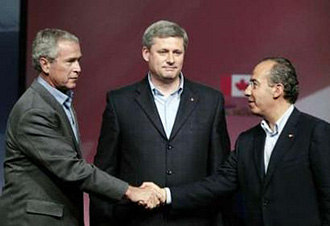 |
 |
 |
 Editorials | Issues | August 2007 Editorials | Issues | August 2007  
Bush, Calderón and Harper Not Buddies
 George E. Condon Jr. - Copley News Service George E. Condon Jr. - Copley News Service
go to original


| | U.S. President George W. Bush (L), Canada's Prime Minister Stephen Harper (C), and Mexico's President Felipe Calderon (R), after participating in a joint press availability after the two-day North American Leaders' Summit at the Fairmont Le Chateau Montebello in Canada, August 21, 2007. (Reuters/Larry Downing) |
Montebello, Canada – If the annual “Three Amigos” summits are designed to showcase North American solidarity, the just-completed meetings in Montebello fell short.

Instead, they provided reminders of how the leaders of Mexico and Canada chafe at what they see as dictates from Washington.

There were three leaders at the summit. But they didn't really seem much like amigos.

In Canadian Prime Minister Stephen Harper and Mexican President Felipe Calderón, President Bush has two continental counterparts who want to keep the relationship strictly businesslike. The change is most striking with Calderón, who took office in December replacing Vicente Fox, who relished the “three amigos” tag.

Fox and Bush shared a common background as border state governors and ranchers. They visited each other's homes, donned cowboy boots and talked about horses.

Calderón is a Harvard-trained economist with no desire to exchange abrazos, or hugs, with Bush. In his few meetings with the U.S. president, he has seemed determined to keep it all business.

For Bush, who likes to personalize his ties to foreign leaders, there was no respite and little warmth to be found by looking northward. Even his penchant for bestowing nicknames on other leaders has gone awry with the Canadian prime minister.

Bush caused a furor in his last meeting with Harper by calling him “Steve.” Harper, it turns out, is a rather formal fellow who is very much a “Stephen” and never a “Steve.” The prime minister said Bush's comment “made my mother quite angry because she's made it her whole life to get people to call me Stephen instead of Steve.”

This time, the president slipped up only once. At Tuesday's press conference, he called his counterpart “Steve” but immediately corrected himself to go with “Stephen.”

Luckily for Bush, all diplomacy and all summits eventually get down to national self-interest. Neither Harper nor Calderón want to be Bush's buddy. In fact, polls in both countries suggest they would do better to be seen as standing up to Bush.

But both recognize the enormous importance of their relations with the United States. As Harper joked about Bush, “If a guy buys 85 percent of our exports and wants to call me Steve, that's OK with me.”

And it is that booming cross-border trade – and the need to make it more efficient – that makes these annual summits of the members of the 1994 North American Free Trade Agreement important.

Jeffrey Davidow, the former U.S. ambassador to Mexico who now is president of the Institute of the Americas at UC San Diego, called the annual summit “extraordinarily important” for the way it drives the government bureaucracy to address problems.

Even with the lack of warmth among the current threesome, Davidow said there is a compatibility because all three leaders are conservatives and “there are no sharp elbows or patent aggressivity.”

Perhaps not surprisingly, the most progress comes when Bush sits down one-on-one with the other leaders because the problems seem to come in bilateral relations.

But always – in all meetings – it is impossible to escape the inequality. Peter Hakim, president of the Inter-American Dialogue, a Washington center on hemispheric affairs, said, “For both Mexico and Canada, the United States is overwhelmingly the most important country, the most important partner, the country they have the most disputes with and the most partnerships with. So there is a certain imbalance.”

That asymmetry makes it unlikely that the three countries will ever form the sovereignty-destroying, rights-gobbling, worker-repressing behemoth that the far-left liberals in Canada and far-right conservatives in the United States fear. Some U.S. conservatives even believe there are secret plans to build a massive NAFTA superhighway from the Texas-Mexico border.

These beliefs led to one of the few moments of wry humor to surface at the summit. Harper said he had seen false predictions of massive flows of Canadian water to the United States “and superhighways to the continent – maybe interplanetary, I'm not sure.”

The leaders here, he said, are thinking much smaller, like setting more uniform rules for jelly bean contents as requested by one of the business leaders they met. “Is the sovereignty of Canada going to fall apart if we standardize the jelly bean? I don't think so.” | 
 | |
 |



